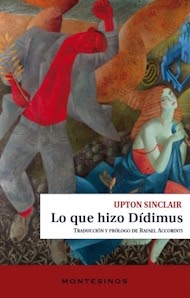
Original language: English
Original title: It happened to Dydimus
Translation: Rafael Accorinti
Year of publication: 1954
Valuation: Lets you read < It's okay
You know those novels that you like even though they could be much better? Have you ever been captivated by a premise that, however, has not been fully expressed? Do you think it is possible to get attached to characters who lack preparation?
All these sensations have caused me to read What Didymus Did. Because Upton Sinclair’s novel is marred by an irregularity in the execution, a lack of definition in the purpose, some loose ends regarding the plot, lack of prominence of the protagonists and certain reiterations. Even so, it is read with interest, it is based on a promising idea and has been executed with the craftsmanship of a mature writer.
The play follows the steps of Tom Strawn, an ignorant young man who has been given powers. Both Tom and the narrator, an academic for whom Tom was gardening, must find out, as far as possible, what the divine mission entrusted to them is supposed to be.
What Didymus Did It is a quite successful satire that reflects on the incompatibility of elevated spirituality and messianic figures with a human being who is too selfish, petty and materialistic. I would only reproach his humor for rarely taking on Tom, a character who, even with his flaws, is too perfect.
Speaking of characters, I have already stated that those in this novel lack cooking. We barely get to know them intimately, because they are too schematic. Even Tom and the narrator, who we see most frequently, seem excessively simple; Furthermore, from a certain point (when Tom becomes more cultured) it is difficult to differentiate them from each other, since they speak and, more or less, think the same.
Regarding the argument of What Didymus Did, you could say that it hasn’t quite explored all the possibilities. In fact, while in some sections it provides stimulating concepts, in others it falls frustratingly short or gets stuck in situations already raised previously. To this we must add several inconsistencies in the internal logic of the fiction, and some repetitions.
Be that as it may, Sinclair’s novel is, I insist, the work of a competent writer. Perhaps it lacks memorability and shows great room for improvement, but reading it nevertheless arouses our interest and a handful of reflections. What more could you want?
Source: https://unlibroaldia.blogspot.com/2024/03/upton-sinclair-lo-que-hizo-didimus.html


